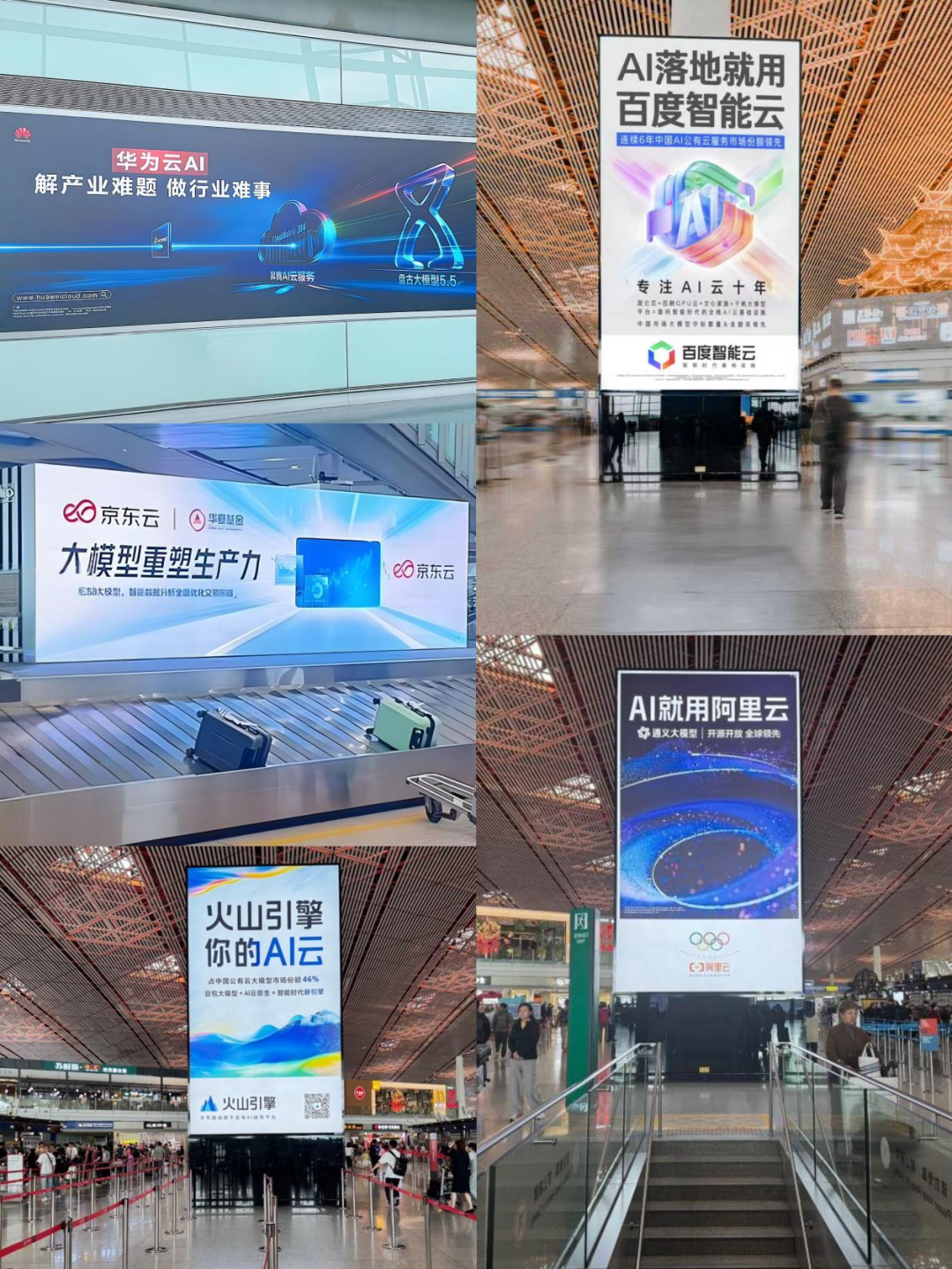AI Cloud Giants Battle for Dominance at Airports
![]() 08/14 2025
08/14 2025
![]() 662
662

Key Points:
1. The battle for cloud computing supremacy has extended to airports. At major hubs such as Beijing Capital Airport and Shanghai Hongqiao Airport, AI cloud providers like Alibaba Cloud and Baidu Intelligent Cloud have virtually taken over all core advertising spaces. Alibaba Cloud aims to capture the AI cloud market share, while Baidu Intelligent Cloud emphasizes AI implementation across various industries.
2. Among cloud providers, those who decisively bet on AI are experiencing faster growth. This trend is consistently being validated on the enterprise side. The earlier an enterprise embraces AI and completes its capability migration, the more likely it is to achieve structural growth in a new technological cycle.
3. Faced with the intricate AI cloud market, enterprises must ensure their chosen AI cloud partners possess extensive, multi-industry, and multi-scenario implementation experience. They must also deliver stable and reliable AI capabilities within complex business systems.
4. The true implementation of AI hinges on constructing a full-stack AI cloud infrastructure. This infrastructure is becoming the most vital foundation for enterprises transitioning towards intelligence.
5. As two prominent players in the domestic AI cloud market, Baidu Intelligent Cloud and Alibaba Cloud have keenly recognized this trend. Baidu Intelligent Cloud's airport advertisements showcase the benchmark of a top-tier infrastructure builder, with deep technical expertise, robust project implementation capabilities, and a full-stack AI cloud infrastructure, making it the preferred choice for more enterprises' intelligent transformation.
Author: Chang Yuan
Editor: Key Point Master
During a recent business trip, Key Point Master observed that the battle for AI cloud dominance has reached airports.
As a crucial offline touchpoint for To B vendors, AI cloud advertising in airports has significantly intensified. At major hubs like Beijing Capital Airport and Shanghai Hongqiao Airport, vendors such as Alibaba Cloud, Baidu Intelligent Cloud, Huawei Cloud, JD Cloud, and China Mobile Cloud have nearly monopolized all core advertising spaces. Some vendors focus on large models, others promote intelligent agents, and still, others display industry implementation collaboration cases.
The rise of AI and large models is reigniting growth expectations across various industries, and cloud vendors are capitalizing on this trend to increase advertising investments, compete for users, and capture market share. The primary value of airport advertising lies in its high-frequency reach among business travelers, particularly government and enterprise customers with purchasing power. During this period, airports have almost transformed into exhibition halls for AI cloud technologies.
The billboard copy from different vendors also unveils their respective strategic inclinations:
Alibaba Cloud: "AI uses Alibaba Cloud; Tongyi Large Model | Open Source and Globally Leading";
Baidu Intelligent Cloud: "AI Implementation Uses Baidu Intelligent Cloud; Leading China's AI Public Cloud Service Market Share for 6 Consecutive Years";
It is evident that Alibaba Cloud aims to capture the AI cloud market share, while Baidu Intelligent Cloud strives to defend its share and emphasizes deep AI implementation. With distinct paths and strategies, the war for AI cloud supremacy is intensifying.
The earlier an enterprise embraces AI, the faster its revenue growth
Over the past decade, Chinese artificial intelligence has evolved through two phases: from "discriminative AI" centered on recognition and classification to "generative AI" characterized by generation and interaction. The early "Four Dragons of AI" began with technologies like speech recognition and image processing, representing a generation of AI technology companies. However, AI at that stage was more akin to a set of fragmented toolboxes, making it challenging to systematically serve enterprise needs.
The turning point came with the release of ChatGPT. For the first time, large language models possessed the ability to understand human intent and demonstrated significant progress in dimensions such as semantic understanding, reasoning, logic, and memory. AI began to transition from handling rule-based problems to participating in dialogues and even executing tasks.
With the accelerated development of domestic large models, models with robust reasoning capabilities and low usage costs, such as DeepSeek, have rapidly gained traction, continuously raising the bar for user experience. By 2025, AI has evolved from the early "usable" stage to the "user-friendly" stage: from writing copy and generating images to creating videos and generating PPTs, to automatic programming and intelligent customer service. Increasingly, enterprises are integrating AI into their business processes, driving organizational restructuring and efficiency improvements.
A crucial point often overlooked is that AI implementation must be built upon cloud infrastructure. The cloud serves as the body to AI's brain—the capability boundaries of AI are constrained by the computing power, storage, network, and other resource allocations it relies on. In other words, AI operates on the cloud, and the cloud determines how fast, stable, and far it can run.
Following the release of ChatGPT, domestic cloud vendors successively introduced models, ushering the cloud computing industry into the era of models. Baidu Intelligent Cloud and Alibaba Cloud were the first two players to fully commit to AI. Baidu pioneered the Wenxin series of large models and the Wenxin Yiyan large model product, which rivals ChatGPT; Alibaba followed suit by releasing Tongyi Qianwen and chose open source and openness as its differentiation strategy.
We have observed that in the cloud computing industry, those who decisively bet on AI are growing faster. IDC data shows that in the second half of 2024, China's public cloud market grew by 17.7% year-on-year, setting a new two-year high. In the first quarter of this year, Alibaba Cloud's revenue grew by 17.7% year-on-year; Baidu Intelligent Cloud led its peers with a year-on-year growth rate of 42%, becoming one of the few domestic cloud vendors to achieve positive momentum.
This trend is also consistently being validated on the enterprise side. The earlier an enterprise embraces AI and completes its capability migration, the more likely it is to achieve structural growth in a new technological cycle. For example, banks are reconstructing customer service and risk control processes through large models, manufacturing enterprises are introducing intelligent quality inspection and Agent-assisted research and development, and retail and e-commerce are using AI to optimize supply chains and marketing rhythms. AI has become an underlying variable that determines core business outcomes such as enterprise efficiency, revenue, and profit growth rates.
If the question of the past decade was "whether to transform," today's question is "how to transform faster."
This is a compulsory question. However, at the specific execution level, most enterprises are still in the early stages of exploration. Business owners first need to determine: Faced with the complex AI cloud market, what kind of AI cloud partner should they choose to realize intelligent transformation?
Implementation is the sole criterion for testing AI clouds
The wave of large models has persisted for nearly two years, yet no blockbuster C-end applications have emerged, nor has the mobile internet era's APP boom been replicated. The reason is straightforward: the true value of large models lies not in C-end consumer scenarios but in specific business scenarios across various industries.
AI is reconstructing the underlying capabilities of enterprises, and during the intelligent transformation process, enterprises typically consider three core criteria when selecting AI cloud partners:
First, absolute stability and reliability. For enterprises, business continuity is a fundamental requirement. Even half an hour of downtime for a core system may mean production line shutdowns, transaction interruptions, or even data loss, with unimaginable consequences.
Second, a profound understanding of the business. AI cannot be "universally implemented" and needs to be embedded in vertical scenarios such as finance, manufacturing, healthcare, and government affairs. Each industry has unique know-how, and AI cloud vendors must deeply comprehend enterprise businesses, providing tailored solutions akin to consultants.
Third, delivering solutions. Essentially, what enterprises purchase is not the technology itself but the ability to use AI to solve practical problems. For example, in the power industry, what enterprises truly need are solutions to issues such as grid security, load scheduling, and power supply configuration, rather than simple model invocations.
What kind of cloud vendor can meet the above criteria? Technology and price are important, but engineering capabilities are more crucial. Enterprises must ensure their chosen AI cloud vendor possesses experience in large-scale, multi-industry, and multi-scenario implementations, and can deliver stable and reliable AI capabilities within complex business systems.

Taking Baidu Intelligent Cloud as an example, the latest brand advertisement states: "Ten years of focus on AI cloud; Kunlun Core + Baige GPU Cloud + Wenxin Family + Qianfan Large Model Platform = Full-stack AI cloud infrastructure for the intelligent era; Leading in both the number and amount of large model bids won in the Chinese market".
Based on previously disclosed information:
First, Baidu is one of the earliest domestic cloud vendors to propose the concept of AI cloud, possessing complete AI technological capabilities from chips to models;
Second, Baidu Intelligent Cloud was also the first to advocate "cloud-intelligence integration," emphasizing the deep integration of AI capabilities with industries to drive implementation. From data over the past few years, it has firmly held onto the top position in China's AI public cloud market share;
Third, Baidu Intelligent Cloud was the first to launch the domestic large model platform Qianfan and has been emphasizing full-stack AI infrastructure beforehand. Public data shows that it leads in both the number and amount of large model bids won in China.
Baidu Intelligent Cloud's engineering implementation capabilities are undeniable and have been validated on a large scale across multiple industries. From frequent public information, Baidu Intelligent Cloud has served 65% of central enterprise customers, TOP 15 new energy vehicle enterprises, and more than half of game manufacturers, and widely supports AI innovation in various industries such as government affairs, manufacturing, and energy.
Alibaba Cloud's advertisements are more focused on its AI cloud positioning and leading open-source models. The open-source strategy has built a vast developer ecosystem for Alibaba Cloud, which is now constructing a collaborative system of "infrastructure-AI platform-commercial implementation" with computing and networking as the foundation, open-source models as the engine, and scenario innovation as the breakthrough.
The key to implementation lies in building full-stack AI cloud infrastructure
Behind the implementation of AI lies the critical element of constructing a comprehensive full-stack AI cloud infrastructure.
"Full-stack" is a professional term originating from the computer field. In the AI era, the computing architecture has evolved from the traditional "chip-operating system-application" to a four-layer architecture of "chip-framework-model-application".
Taking Baidu as an example, it is one of the few domestic technology companies with full-chain self-research capabilities, encompassing everything from underlying chips and deep learning frameworks to large language models, and further to industry and C-end applications. The greatest advantage of full-stack self-research is the ability to perform end-to-end optimization, making AI systems more efficient, stable, and secure, while also lowering the barriers to entry and costs for enterprises. Specifically at the cloud computing level, AI cloud vendors need to build a complete AI cloud infrastructure spanning from computing platforms, data service platforms, model development platforms, to deployment platforms. A full-stack architecture can support enterprises' full-process needs from model training to business access. Simultaneously, possessing full-stack capabilities also means being able to serve diverse needs and adapt to complex scenarios. For example, in traditional manufacturing, finance, government affairs, and other industries with low data quality and limited budgets, full-stack AI cloud vendors can complete model fine-tuning and deployment at lower costs. In scenarios with extremely high security and autonomy requirements such as state-owned and central enterprises, full-stack AI cloud vendors are also the only option to complete the closed loop from hardware to delivery.
The key to AI implementation lies in full-stack infrastructure, and Alibaba Cloud, another heavyweight player in AI clouds, shares the same view. The AI era places higher demands on the performance and efficiency of infrastructure, and the CPU-dominated computing system is rapidly shifting to the GPU-dominated AI computing system. From building the "CIPU+Tianji" infrastructure in the CPU cloud era to centering on AI in the GPU era and fully reconstructing underlying hardware, computing, storage, networking, databases, and data to accelerate model development and application, Alibaba Cloud is also actively constructing the strongest AI infrastructure for the AI era.
Final Thoughts
AI is now at a pivotal juncture, transitioning from "technological breakthroughs" to "engineering delivery," and the competitive landscape of China's AI cloud market is rapidly converging. The crux of this competition hinges on a fundamental question: who can effectively implement AI and successfully deliver it to customers. In China, the key players currently poised to lead this race appear to be primarily Alibaba Cloud, Baidu Intelligent Cloud, and a select few others. This is a protracted battle, and the ultimate victor will be determined by which player demonstrates the strongest strategic resolve.






